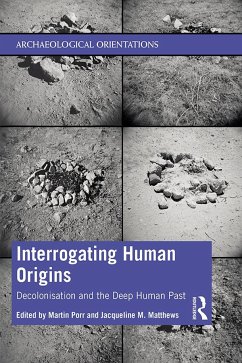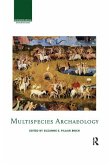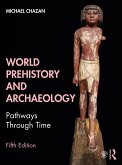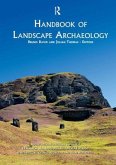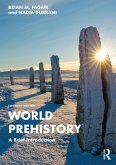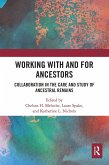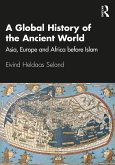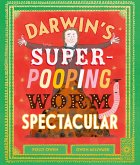Interrogating Human Origins
Decolonisation and the Deep Human Past
Herausgeber: Porr, Martin; Matthews, Jacqueline
Interrogating Human Origins
Decolonisation and the Deep Human Past
Herausgeber: Porr, Martin; Matthews, Jacqueline
- Broschiertes Buch
- Merkliste
- Auf die Merkliste
- Bewerten Bewerten
- Teilen
- Produkt teilen
- Produkterinnerung
- Produkterinnerung
Interrogating Human Origins encourages new critical engagements with the study of human origins, broadening the range of approaches to bring in postcolonial theories, and beginning to explore the decolonisation of this complex topic.
Andere Kunden interessierten sich auch für
![Multispecies Archaeology Multispecies Archaeology]() Multispecies Archaeology49,99 €
Multispecies Archaeology49,99 €![World Prehistory and Archaeology World Prehistory and Archaeology]() Michael Chazan (Canada University of Toronto)World Prehistory and Archaeology117,99 €
Michael Chazan (Canada University of Toronto)World Prehistory and Archaeology117,99 €![Handbook of Landscape Archaeology Handbook of Landscape Archaeology]() Handbook of Landscape Archaeology69,99 €
Handbook of Landscape Archaeology69,99 €![World Prehistory World Prehistory]() Brian M. Fagan (USA University of California)World Prehistory89,99 €
Brian M. Fagan (USA University of California)World Prehistory89,99 €![Working with and for Ancestors Working with and for Ancestors]() Working with and for Ancestors58,99 €
Working with and for Ancestors58,99 €![A Global History of the Ancient World A Global History of the Ancient World]() Eivind Heldaas SelandA Global History of the Ancient World40,99 €
Eivind Heldaas SelandA Global History of the Ancient World40,99 €![Darwin's Super-Pooping Worm Spectacular Darwin's Super-Pooping Worm Spectacular]() Polly OwenDarwin's Super-Pooping Worm Spectacular18,99 €
Polly OwenDarwin's Super-Pooping Worm Spectacular18,99 €-
-
-
Interrogating Human Origins encourages new critical engagements with the study of human origins, broadening the range of approaches to bring in postcolonial theories, and beginning to explore the decolonisation of this complex topic.
Hinweis: Dieser Artikel kann nur an eine deutsche Lieferadresse ausgeliefert werden.
Hinweis: Dieser Artikel kann nur an eine deutsche Lieferadresse ausgeliefert werden.
Produktdetails
- Produktdetails
- Archaeological Orientations
- Verlag: Taylor & Francis Ltd
- Seitenzahl: 368
- Erscheinungstermin: 18. Dezember 2019
- Englisch
- Abmessung: 246mm x 174mm x 20mm
- Gewicht: 644g
- ISBN-13: 9781138300439
- ISBN-10: 1138300438
- Artikelnr.: 58438637
- Herstellerkennzeichnung
- Libri GmbH
- Europaallee 1
- 36244 Bad Hersfeld
- gpsr@libri.de
- Archaeological Orientations
- Verlag: Taylor & Francis Ltd
- Seitenzahl: 368
- Erscheinungstermin: 18. Dezember 2019
- Englisch
- Abmessung: 246mm x 174mm x 20mm
- Gewicht: 644g
- ISBN-13: 9781138300439
- ISBN-10: 1138300438
- Artikelnr.: 58438637
- Herstellerkennzeichnung
- Libri GmbH
- Europaallee 1
- 36244 Bad Hersfeld
- gpsr@libri.de
Jacqueline M Matthews is a professional archaeologist with Cultural Heritage Management Australia and has wide-ranging experience working with Indigenous communities across Australia. She completed her Masters thesis at University of Western Australia focused on the application of ontological and postcolonial theories to Australian archaeology, which lead to a research interest in the role of Australia in global debates about human origins. Martin Porr is Associate Professor of Archaeology and a member of the Centre for Rock Art Research + Management at the University of Western Australia (UWA). His research has so far concentrated on aspects related to Palaeolithic European art, Australian rock art, human origins and postcolonial approaches towards archaeological research. He has conducted fieldwork in Germany, Thailand, Australia, India and the Philippines.
Section 1: Introduction; Chapter 1 Interrogating and decolonising the deep
human past; Section 2: Definition of the human and its colonial legacy;
Chapter 2 IMHO: inventing modern human origins; Chapter 3 Modern ontologies
of the 'more-than-animal' human: provincialising humanism for the present
day; Chapter 4 Colonialism and narratives of human origins in Asia and
Africa; Chapter 5 Primordialising Aboriginal Australians: colonialist
tropes and Eurocentric views on behavioural markers of modern humans;
Section 3: Representation, temporality and narratives of human origins;
Chapter 6 Old Flames: rekindling ideas of fire, humanity and representation
through creative art practice; Chapter 7 Orientalism and origins: the
search for firsts in the 'Cradle of Civilization'; Chapter 8 The Beast
Without. Becoming human in the science fiction of H.G. Wells; Chapter 9 The
temporality of humanity and the colonial landscape of the deep human past;
Section 4: National, political and historical dimensions of human origins;
Chapter 10 The Far West from the Far East: decolonisation and human origins
in East Asia: the legacy of 1937 and 1948; Chapter 11 Interpretative shifts
in understanding the prehistoric settlement of the Indian Subcontinent:
comparing Western and Indian historical perspectives; Chapter 12 Our
earliest ancestors: human and non-human primates of North America; Chapter
13 "If we are all African, then I am nothing", hominin evolution and the
politics of identity in South Africa; Section 5: The construction of
genetic facts; Chapter 14 Naming the sacred ancestors: taxonomic
reification and Pleistocene genomic narratives; Chapter 15 Traditional
owner participation in genetic research: a researcher perspective
human past; Section 2: Definition of the human and its colonial legacy;
Chapter 2 IMHO: inventing modern human origins; Chapter 3 Modern ontologies
of the 'more-than-animal' human: provincialising humanism for the present
day; Chapter 4 Colonialism and narratives of human origins in Asia and
Africa; Chapter 5 Primordialising Aboriginal Australians: colonialist
tropes and Eurocentric views on behavioural markers of modern humans;
Section 3: Representation, temporality and narratives of human origins;
Chapter 6 Old Flames: rekindling ideas of fire, humanity and representation
through creative art practice; Chapter 7 Orientalism and origins: the
search for firsts in the 'Cradle of Civilization'; Chapter 8 The Beast
Without. Becoming human in the science fiction of H.G. Wells; Chapter 9 The
temporality of humanity and the colonial landscape of the deep human past;
Section 4: National, political and historical dimensions of human origins;
Chapter 10 The Far West from the Far East: decolonisation and human origins
in East Asia: the legacy of 1937 and 1948; Chapter 11 Interpretative shifts
in understanding the prehistoric settlement of the Indian Subcontinent:
comparing Western and Indian historical perspectives; Chapter 12 Our
earliest ancestors: human and non-human primates of North America; Chapter
13 "If we are all African, then I am nothing", hominin evolution and the
politics of identity in South Africa; Section 5: The construction of
genetic facts; Chapter 14 Naming the sacred ancestors: taxonomic
reification and Pleistocene genomic narratives; Chapter 15 Traditional
owner participation in genetic research: a researcher perspective
Section 1: Introduction; Chapter 1 Interrogating and decolonising the deep
human past; Section 2: Definition of the human and its colonial legacy;
Chapter 2 IMHO: inventing modern human origins; Chapter 3 Modern ontologies
of the 'more-than-animal' human: provincialising humanism for the present
day; Chapter 4 Colonialism and narratives of human origins in Asia and
Africa; Chapter 5 Primordialising Aboriginal Australians: colonialist
tropes and Eurocentric views on behavioural markers of modern humans;
Section 3: Representation, temporality and narratives of human origins;
Chapter 6 Old Flames: rekindling ideas of fire, humanity and representation
through creative art practice; Chapter 7 Orientalism and origins: the
search for firsts in the 'Cradle of Civilization'; Chapter 8 The Beast
Without. Becoming human in the science fiction of H.G. Wells; Chapter 9 The
temporality of humanity and the colonial landscape of the deep human past;
Section 4: National, political and historical dimensions of human origins;
Chapter 10 The Far West from the Far East: decolonisation and human origins
in East Asia: the legacy of 1937 and 1948; Chapter 11 Interpretative shifts
in understanding the prehistoric settlement of the Indian Subcontinent:
comparing Western and Indian historical perspectives; Chapter 12 Our
earliest ancestors: human and non-human primates of North America; Chapter
13 "If we are all African, then I am nothing", hominin evolution and the
politics of identity in South Africa; Section 5: The construction of
genetic facts; Chapter 14 Naming the sacred ancestors: taxonomic
reification and Pleistocene genomic narratives; Chapter 15 Traditional
owner participation in genetic research: a researcher perspective
human past; Section 2: Definition of the human and its colonial legacy;
Chapter 2 IMHO: inventing modern human origins; Chapter 3 Modern ontologies
of the 'more-than-animal' human: provincialising humanism for the present
day; Chapter 4 Colonialism and narratives of human origins in Asia and
Africa; Chapter 5 Primordialising Aboriginal Australians: colonialist
tropes and Eurocentric views on behavioural markers of modern humans;
Section 3: Representation, temporality and narratives of human origins;
Chapter 6 Old Flames: rekindling ideas of fire, humanity and representation
through creative art practice; Chapter 7 Orientalism and origins: the
search for firsts in the 'Cradle of Civilization'; Chapter 8 The Beast
Without. Becoming human in the science fiction of H.G. Wells; Chapter 9 The
temporality of humanity and the colonial landscape of the deep human past;
Section 4: National, political and historical dimensions of human origins;
Chapter 10 The Far West from the Far East: decolonisation and human origins
in East Asia: the legacy of 1937 and 1948; Chapter 11 Interpretative shifts
in understanding the prehistoric settlement of the Indian Subcontinent:
comparing Western and Indian historical perspectives; Chapter 12 Our
earliest ancestors: human and non-human primates of North America; Chapter
13 "If we are all African, then I am nothing", hominin evolution and the
politics of identity in South Africa; Section 5: The construction of
genetic facts; Chapter 14 Naming the sacred ancestors: taxonomic
reification and Pleistocene genomic narratives; Chapter 15 Traditional
owner participation in genetic research: a researcher perspective

